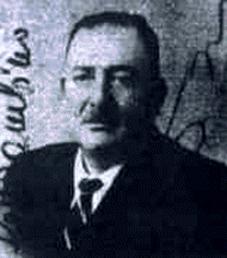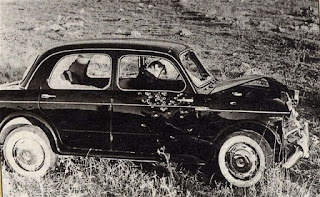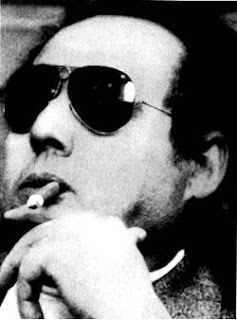Hospital doctor who headed Corleone clan
 |
| Michele Navarra was an eminent physician in Corleone |
Michele Navarra, an extraordinary figure who became the
leading physician in his home town of Corleone while simultaneously heading up one
of the most notorious clans in the history of the Sicilian Mafia, was born on
this day in 1905.
Dr Navarra was a graduate of the University of Palermo,
where he studied engineering before turning to medicine, and became a captain
in the Royal Italian Army. He could have had a comfortable and worthy career as
a doctor.
Yet he developed a fascination with stories about his uncle,
Angelo Gagliano, who had until he was murdered when Navarra was a boy of about
10 years old been a member of the Fratuzzi – the Brothers – a criminal organisation
who leased agricultural land from absentee landlords and then sublet it to
peasant farmers at exorbitant rates, enforcing their authority by extorting
protection money, as well as by controlling the hiring of workers.
As the son of a land surveyor, Navarra already enjoyed
privileges inaccessible to most of the population and his medical
qualifications only further lifted his standing in the community. Somehow,
though, it was not enough.
After the Allied invasion of Sicily in 1943, having
co-operated with the Anglo-American forces, Navarra took advantage of his
relationship with Angelo di Carlo, a Sicilian cousin in the American marines who had
used his Mafia connections to become a vital go-between for the Office of
Strategic Services (precursor of the CIA) in obtaining intelligence ahead of
the invasion.
 |
| Navarra, along with a fellow doctor, was killed in his car in an ambush on a country road |
The occupying army were determined to remove Fascist party
members from power on the island, so Navarra presented himself as an
anti-Fascist and, with Di Carlo’s help, secured the right to round up and take
possession of all military vehicles abandoned by the Italian army.
He used some of these to set up a regional bus service but
others became vital to his cattle rustling operations, which enabled him to
establish himself as an important figure in the criminal underworld, to the
extent that, when Corleonese clan boss Cologero Lo Bue died in 1944 – from
natural causes – Navarra was able to fight off a challenge from Vincenzo
Collura, a Sicilian-born American gangster, to take over as Lo Bue’s succssor.
At the same time, remarkably, Dr Navarra was advancing his
medical career. In 1946, he was
appointed the lead physician at Corleone’s local hospital (after his
predecessor was mysteriously murdered) and enjoyed enormous respect in the
community for his skill and diligence, and his generosity in waiving fees for
those in financial hardship. Often, he would be invited to be godfather to the
children of grateful patients.
When Corleone people spoke of him, they called him 'u patri nostru - Sicilian dialect for 'our father'.
 |
| Luciano Leggio, Navarra's former lieutenant, ultimately betrayed his boss |
Yet it was his criminal activity that was the real source of
his wealth and power. The Corleonese clan controlled not only cattle rustling
but all manner of other activities, legitimate or otherwise, thanks to Dr
Navarra’s influence in the award of local government contracts.
As a member of the Christian Democrat party, he did what he
could to keep the party in power locally and was duly rewarded, even if his
methods were somewhat unusual. Voters
were often escorted into the polling booths by gang members to ensure they
voted the right way, Dr Navarra having issued certificates to say they were
blind had to be assisted at the ballot box.
More sinisterly, he despatched his young lieutenant, Luciano
Leggio, to murder Placido Rizzotto, a trade union leader who was gaining
popularity for the Socialist party.
Navarra exploited his standing to develop powerful political
allies, who in turn handed him prestigious positions. For a while, for example, he was the official
medical adviser to Ferrovie dello Stato, the state rail network.
He was always well dressed, genteel even, yet almost every
week he would issue the order for someone to be killed, either an opponent or
an individual who in some way was an impediment to his progress.
Navarra was careful to keep his own hands clean, always
commissioning murders through a third party. Seldom could a killing be traced
back to him, although he was sent into exile in Reggio Calabria after being
accused of personally silencing, though a lethal injection, the only witness to
the Rizzotto murder.
It was during his exile that his former underling, Leggio, developed his own rackets and tried to seize power. Navarra tried to
have him killed in the summer of 1958 but the plot failed and it was only a few
months later that Navarra's car was ambushed on an isolated country road and he died,
along with an innocent colleague from the hospital, in a hail of machine gun
fire.
Among the suspected killers were two notorious future bosses
of the Corleonese clan, Salvatore ‘Toto’ Riina and Bernardo Provenzano.
 |
| The Palazzo Chiaramonte-Steri |
Travel tip:
The University of Palermo, founded in 1806 but with roots in
learning traceable to the 15th century, when medicine and law were
first taught on the site, is home to about 50,000 students. It is notable among other things for the
Palazzo Chiaramonte-Steri, the 14th century palace that was once the
home of the powerful Sicilian ruler Manfredi III Chiaramonte, which now houses
the rector’s office and a museum, and the 30-acre Orto Botanico (Botanical
Gardens).
 |
| The Palazzo Comunale overlooks the Piazza Garibaldi at the heart of Corleone |
Travel tip:
Although the town of Corleone was immortalised in fiction by
Mario Puzo’s novel The Godfather and the film of the same name, its Mafia past
is only too real and citizens lived an oppressed life for many years, fearful
of even admitting that the secret society existed. Nowadays, there are organisations that are
proudly anti-Mafia and the confiscated home of one-time leader Bernardo
Provenzano has been turned into an anti-Mafia museum and art gallery in memory
of Paolo Borsellino, the anti-Mafia magistrate who was murdered in 1992.